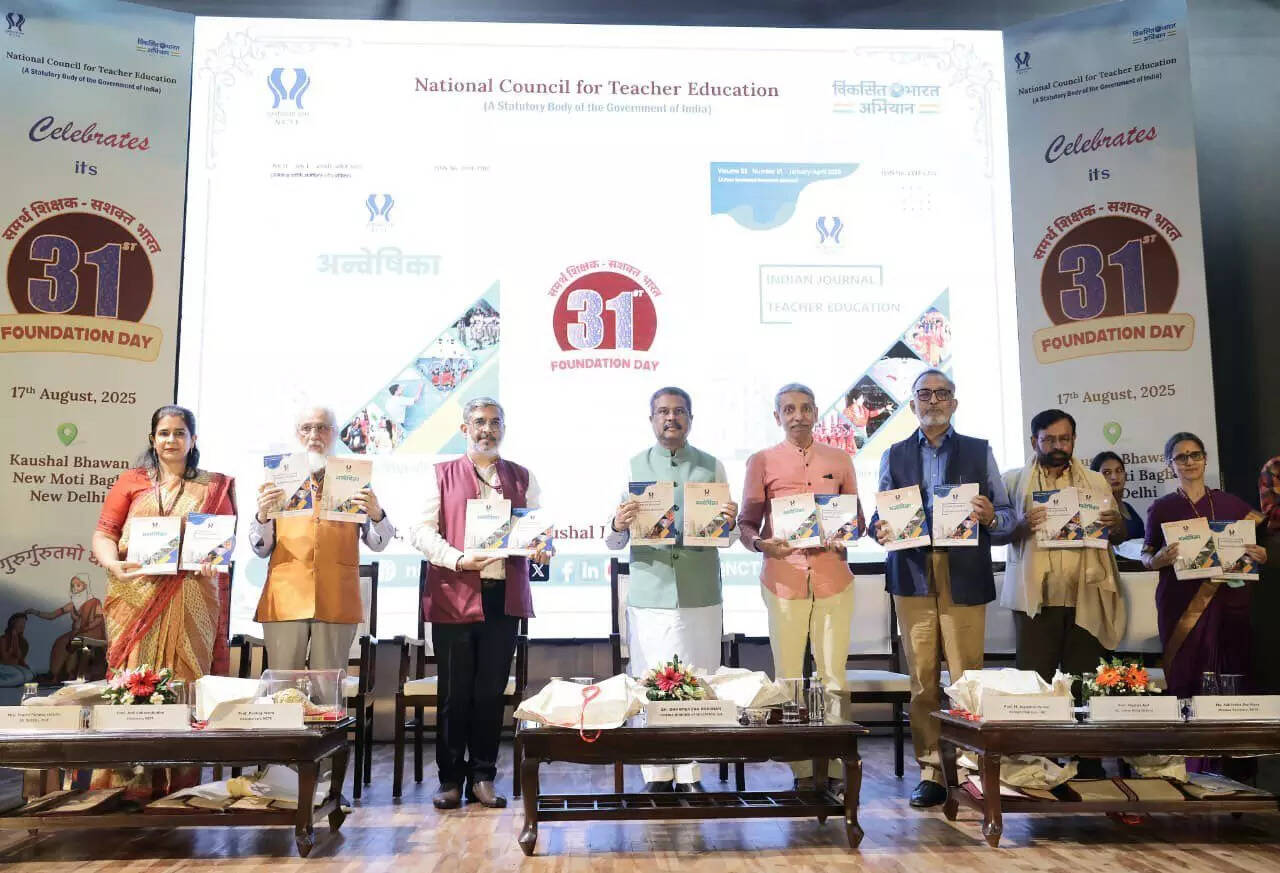
The National Council for Teacher Education (NCTE) celebrated its 31st Foundation Day on 17th August 2025 at Kaushal Bhawan, New Delhi, marking over three decades of shaping India’s teacher education landscape.
Constituted under the NCTE Act of 1993 and operational since 1995, the Council has played a pivotal role in maintaining standards and ensuring the coordinated development of teacher education across the country.
With the launch and implementation of NEP 2020-aligned initiatives such as the Integrated Teacher Education Programme (ITEP), National Professional Standards for Teachers (NPST), and National Mission for Mentoring (NMM), NCTE continues to lead transformative reforms in the teacher education sector.
This year’s theme, “समर्थ शिक्षक सशक्त भारत” ( (Empowered Teachers – Empowered India), reflected the growing national recognition of teachers as catalysts for inclusive development and global competitiveness.
The programme commenced with the welcome address by Prof. Pankaj Arora, Chairperson, NCTE, and a short documentary tracing NCTE’s evolution over three decades. Prof. Arora highlighted the flagship programmes of NCTE and the structural reforms undertaken by the Council in alignment with the vision of NEP 2020. The event also featured the revival of its two Journals—अन्वेशिका (Anweshika) in Hindi and the Indian Journal of Teacher Education (IJTE) in English.
Union Minister for Education Dharmendra Pradhan, who graced the occasion as the Chief Guest, emphasized the centrality of teachers in achieving the vision of Viksit Bharat @2047. While conveying the heartfelt greetings at this festive occasion, Pradhan reiterated that NEP 2020 is a collective national vision, where empowered teachers are essential to minimize existing learning gaps among the school and higher education students and also emphasized that teachers should motivate students to choose passion over profession.
The message of the Prime Minister of India, Narendra Modi, was recalled, highlighting the vision of building a ‘समृद्ध भारत’ (Prosperous India) by Shri. Pradhan.
Speaking on the occasion, Prachi Pandey, Joint Secretary, Department of School Education and Literacy (DoSEL), Ministry of Education asserted teachers as the foundation on which the success of NEP 2020 rests. Smt. Pandey acknowledged the completion of five years of NEP 2020 journey and emphasized its contribution towards ensuring quality access for teachers.
Prof. M. Jagadesh Kumar, former Chairperson, University Grants Commission, praised NCTE’s pioneering work in embedding NEP’s principles into teacher education. Prof. Kumar highlighted the transformation of NCTE, AICTE and UGC as regulatory bodies under the Higher Education Commission of Indi and placed a significant emphasis on the relevance of a multilingual classroom and effective learning ecosystem.
Prof. Anil Sahasrabudhe, Chairman, National Educational Technology Forum (NETF), highlighted the evolving role of NCTE and congratulated on reviving NCTE Journals IJTE and Anweshika. Prof. Sahasrabudhe emphasized the integration of technology, artificial intelligence, Indian Knowledge System (IKS), Indian languages, and NEP 2020–aligned curriculum design as key drivers of reform in the education sector and acknowledged the importance of active participation in authorship and development of academic resources at both school and higher education levels.
The celebration brought together over 250 distinguished participants, including senior officers from the Ministry of Education, Council members of regional committees, representatives from national and state education bodies, teacher educators, institutional heads, scholars, and student-teachers.
A vibrant cultural presentation by ITEP students added colour to the event, and three outstanding mentors from the National Mission for Mentoring (NMM) were felicitated for their exceptional service as Star Mentors. The ceremony concluded with a heartfelt vote of thanks delivered by Abhilasha Jha Misra, Member Secretary, NCTE, followed by the National Anthem. Misra’s address placed on record the Ministry of Education’s trust in NCTE and reaffirmed the organization’s commitment to the theme “समर्थ शिक्षक सशक्त भारत”.
The efforts of college students were also duly acknowledged for showcasing their exceptional talents through cultural performances.
Transcending the bounds of a ceremonial occasion, the 31st Foundation Day stood as a reaffirmation of NCTE’s enduring mission—advancing educational reforms, strengthening institutional capacities, and empowering educators to lead India’s transformation into a global leader in the field of education and knowledge, thereby contributing to the vision of Viksit Bharat.
